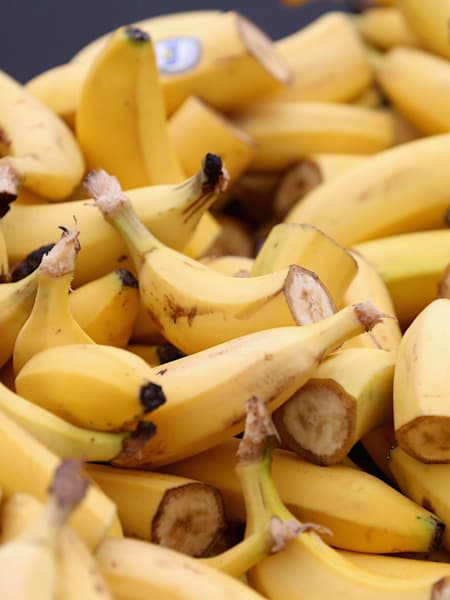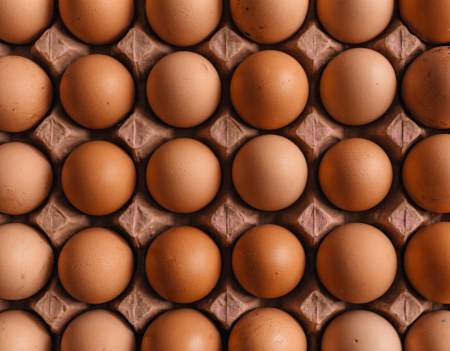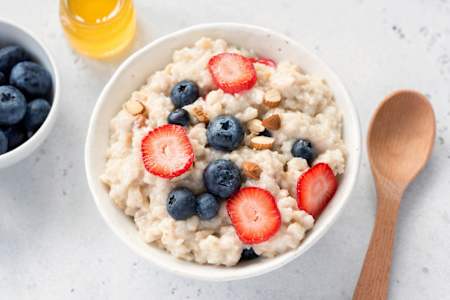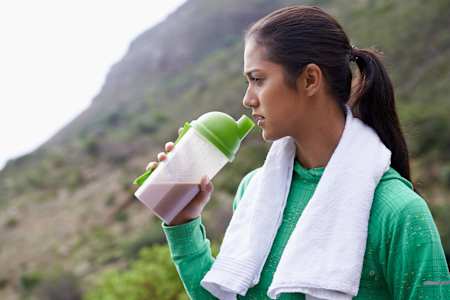The 11th edition of the Wings for Life World Run will take place on Sunday, May 5, 2024. For registration updates, complete global results and unforgettable highlights: visit www.wingsforlifeworldrun.com and download the new Wings for Life World Run App for iOS or Android.
As any seasoned marathon runner knows all too well, even the fittest, most capable athletes can be scuppered by inadequate nutrition. Clocking up miles in training is only part of the equation. Your engine needs fuel – in training and on race day.
Whether you're going for a full-blown marathon this year, or simply looking to achieve as many miles as you can, these nutrition tips could help you go faster and be stronger than ever.
Calorie intake
Just starting your marathon training? Adjust your daily calorie intake to account for it. “If you increase training volume without addressing your energy intake, you could find your ability to train reduces and your overall health suffers,” explains Alexandra Cook of The Sports Dietitian, who works with elite marathon runners and has completed more than 20 marathons herself.
Running burns between 100-120 calories per mile, so if you’re ramping up the mileage, you need to ensure you’re consuming enough calories to fuel your energy needs – even on the days you don’t train. “Although you are not training on a rest day, your body is still working hard going through the recovery and adaptation process from that week’s training,” says Cook. “Ensure you eat protein and carbohydrates at each meal and plenty of fruit and vegetables, as they are rich in antioxidants [which protect the body from oxidative stress, stimulated by prolonged exercise]."
Calculating your calorie intake
To get an idea of your daily calorie output, Cook recommends using the Schofield Equation, to estimate your Basal Metabolic Rate (the rate of calories your body needs to function at rest):
Men 18-29 years: 15.1 x weight in kg + 692 = BMR
Men 30-58 years: 11.5 x weight in kg + 873 = BMR
Women 18-29 years: 14.8 x weight in kg + 487 = BMR
Women 30-59 years: 8.3 x weight in kg + 846 = BMR
Once you've worked out your BMR, you then take this figure and apply it to one of the following activity level calculations:
Inactive men and women: 1.4 x BMR
Moderately active women: 1.6 x BMR
Moderately active men: 1.7 x BMR
Very active women: 1.8 x BMR
Very active men: 1.9 x BMR
To determine your activity levels, you can use the following key:
Inactive – This is someone who does not have a physically demanding job (e.g. they're predominantly desk bound), and does not do any structured exercise.
Moderately active – This is someone who has a more physically demanding job, and exercises at a moderate intensity approximately three times per week.
Very active – This is someone who exercises for an hour per day at a high intensity. Or someone who has a physically demanding job, supplemented by regular exercise.
In the early stages of marathon training – where you’re training for up to an hour, three to five times a week – you are likely to fall into the 'moderately active' category (provided you don’t have a physically demanding job, in which case, you would be classified as 'very active'). As the training load increases and you are doing longer and more intense sessions, you would also be classified as 'very active'.
So to put this together in an example, if you’re female and your Basal Metabolic Rate is 1,385, and you’ve identified yourself as being 'moderately active', you would multiply this by 1.6 to determine how many calories your body needs per day: 1385 x 1.6 = 2,216 calories.
Carbohydrates
Carbohydrates, which are broken down into glucose and either absorbed by the bloodstream or stored as glycogen, are the body’s quickest source of energy. But just how much should you be consuming on the days you train? “The higher the training volume, the higher the demand for carbohydrate,” says Cook, who points to the rough guide below, based on duration of exercise, to work out the carbohydrate needs of an average (not elite) marathon runner.
Light intensity (<1 hour of exercise per day): 3-5g of carbs per kilo of body weight
Moderate intensity (>1 hour of exercise per day): 5-7g of carbs per kilo of body weight
High intensity (1-3 hours of moderate to high intensity exercise per day): 6-10g of carbs per kilo of body weight
Very high intensity (4+ hours moderate to high intensity exercise per day): 8-12g of carbs per kilo of body weight
For example, if you exercise for around three hours a day, the formulation would be:
[Your weight in kg] x 6 = recommended carbohydrate intake in grams.
Sources of carbohydrate include rolled oats, potatoes, rice, bread and bananas.
Protein
Marathon nutrition isn’t just about fuelling your body, but aiding muscle repair, too – enter protein. “During marathon training there’s a lot of wear and tear to the muscles, so I always advise increasing your protein intake,” says nutritionist Renee McGregor, who works with athletes and Olympians (and is an ultrarunner herself). McGregor recommends consuming 1.4-1.8g of protein per kilo of body weight each day.
In other words: [Your weight in kg] x 1.4 = recommended daily protein intake in grams.
Sources of protein include eggs, Greek yoghurt, fish, chicken, lentils and pulses.
Pre-run fuel
Finding the perfect breakfast for before a long run can be a process of trial and error, but generally speaking, try and mimic what you plan to eat on marathon day. “This trains the gut while also providing you with confidence that it works for you,” explains McGregor, who recommends a good intake of complex carbohydrate prior to a long run to help sustain your energy levels. “Something like porridge with fruit, nuts and honey or a wholegrain bagel topped with nut butter and banana,” she explains.
Post-run fuel
Marathon training means consecutive running days, so fuelling your recovery is paramount. “If you’re running for more than 90 minutes, you’re depleting your glycogen stores so it’s important to restore those as quickly as possible,” explains McGregor. “For endurance training, carbohydrate is more important than protein, so you want something that is a combination of 3:1 carbs to protein.”
McGregor points to milk as being a great post-run recovery choice. “You absorb it really quickly and it replenishes glycogen stores really fast.” Other good post-run options include a smoothie of milk, yogurt and banana, or eggs on toast. For a main meal, McGregor suggests having a jacket potato and tuna salad.
Race-day nutrition
Practise your marathon nutrition strategy before race day
© Alfred Jürgen Westermeyer / Red Bull Content Pool
How will you know whether that cherry flavour energy gel will sit nicely in your stomach by mile 15? Practise. “Without a doubt, one of the biggest things you can do is practise your fuelling strategy as much as you possibly can,” says McGregor. “It’s not natural for your stomach to take on nutrition while running, but you can train your gut to cope with it.”
For best results, practise your pre-race meal and replicate your nutrition plan during training runs. “Unless you practise it, your body doesn’t learn how to oxidise carbohydrate efficiently,” McGregor warns.
Although carbohydrates are the body's preferred source of energy, the body can only store enough for between one-and-a-half and two hours of exercise, so it's vital to keep your carb stores topped up as you run. Find yourself in a deficit in training or on marathon day and you risk hitting the wall. “Hitting the wall occurs when we’ve depleted our carbohydrate stores,” Cook explains. “It affects our ability to run and is accompanied by extreme fatigue and negative feelings.”
To prevent this happening, “begin fuelling within 20 minutes of starting your marathon," advises Cook, who suggests taking on 30-60g of carbohydrate an hour (go for the upper end if you have a two-to-three-hour finishing goal). Energy drinks, such as Red Bull, energy gels and energy chews all provide easily absorbable forms of carbohydrate, but the gut can only absorb 60g of carbohydrate an hour, so don’t think ‘more is more'.
Feeling queasy? “If you can’t stomach much during the run, take on what carbohydrate you can – even small quantities have been shown to improve performance,” recommends Cook. “If you prefer an energy drink, try to sip between six and eight mouthfuls every 15 minutes.”
Lastly, don’t forget to stay hydrated. Marathon conditions and your own personal sweat levels mean hydration is very individual, but as a basic rule, Cook suggests drinking 150ml of liquid every 15 minutes – the equivalent to a cup every two miles.
Here’s how sports nutrition roughly stacks up:
Energy drink:28g carbohydrate per 250ml can of Red Bull
Energy gel: approx. 22-27g carbohydrate
Energy chew: approx. 27g carbohydrate per serving
Banana: approx. 25g carbohydrate
Three days before
Pasta parties might sound fun, but the efficient way to fill your glycogen stores (and avoid feeling sluggish) is to tweak the ratio of carbs in your diet around three days before a race. “There’s a misconception that you should be bulking up the night before, but that’s one of the worst things you can do for your stomach,” says McGregor.
Instead, if your marathon’s on a Sunday, McGregor advises starting on Thursday and Friday by swapping elements of your usual diet for carbs. “For example, if you usually have a piece of fruit or a protein bar as a snack, swap it for two slices of malt loaf or a hot cross bun. Or if you have porridge with nuts and honey for breakfast, swap the nuts for a banana,” she explains.
Struggle to add solid carbs to your diet? Drinking diluted fruit juice “adds extra carbohydrate without being bulky,” says McGregor.
One day to go
The day before your marathon, make lunch your main meal and choose a lighter, easily digestible dinner, such as a sweet potato with soup and a little bread, recommends McGregor. “A lot of people will overload the night before and feel really uncomfortable on Sunday morning because their stomach hasn’t had time to digest all the food,” warns McGregor, who also suggests reducing the amount of fibre and dairy in your diet 48 hours before a race.
Race morning
Feeling nervous on race morning? It’s natural. Relax and eat what you can stomach. “If you’ve filled your glycogen stores in the days running up to the race, what you eat on marathon morning won’t make that much difference,” says McGregor.
That said, you should still stick to a breakfast you're familiar with. McGregor says: “If you normally have peanut butter on toast, have that. Control the controllables by planning ahead and having your usual food and nutrition with you.”
Eat between one and four hours ahead of your race, depending on what you've practised in training. “If that means you have to eat in the car while travelling, ensure you have something portable with you,” says McGregor.
Post-race
Once you've crossed the line, enjoy the moment and your post-race meal
© Caiaimage/Sam Edwards/Getty Images
Once you’ve crossed the line, it’s celebration time, so enjoy your achievement and don’t worry too much about strict recovery nutrition. “In training, you need to maximise your recovery so you can go and train again the next day, but after a marathon, most people take a few days off, so it doesn’t really matter. You’re probably going to eat a meal within the next couple of hours anyway and will get what you need through that,” explains McGregor.
Find out more about Alexandra Cook at thesportsdietitian.co.uk, and Renee McGregor at reneemcgregor.com
















